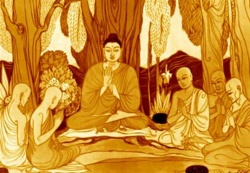Difference between revisions of "Shibi"
(Created page with "thumb|250px| <poem> '''Shibi''' [尸毘王] (Skt; Jpn Shibi-o) The name of Shakyamuni in a past existence when he was the ruler of a great k...") |
|||
| Line 1: | Line 1: | ||
[[File:Buddha-teaching2.jpg|thumb|250px|]] | [[File:Buddha-teaching2.jpg|thumb|250px|]] | ||
<poem> | <poem> | ||
| − | '''Shibi''' | + | '''[[Shibi]]''' |
[尸毘王] (Skt; Jpn Shibi-o) | [尸毘王] (Skt; Jpn Shibi-o) | ||
| − | The name of Shakyamuni in a past existence when he was the ruler of a great kingdom, according to The Garland of Birth Stories. That work compares King Shibi's love for the people to a mother's love for her children. He was seeking the teachings of a Buddha, and one day the god Vishvakarman and the god Shakra decided to test him. They disguised themselves respectively as a dove and a hawk, the hawk relentlessly pursuing the dove, which flew into King Shibi's robes for protection. The hungry hawk demanded the dove as food, and Shibi decided that to save the dove he would offer the hawk an amount of his own flesh equal to the weight of the dove. He sliced off a piece of his flesh, placed it on one side of a balance, and placed the dove on the other. Strangely enough, although he continued slicing off his flesh and placing it on the scale, he could not equal the weight of the dove. Finally he placed himself on the scale, demonstrating his willingness to offer his entire body, and felt such delight and satisfaction as he had never experienced. At that time, Vishvakarman and Shakra reverted to their original forms as Buddhist gods and praised his practice of almsgiving. After Shakyamuni relates this story to his disciples, he reveals that King Shibi was himself in a past existence. | + | The name of [[Shakyamuni]] in a past [[existence]] when he was the ruler of a great kingdom, according to The Garland of [[Birth]] Stories. That work compares [[King]] Shibi's [[love]] for the [[people]] to a mother's [[love]] for her children. He was seeking the teachings of a [[Buddha]], and one day the [[god]] [[Vishvakarman]] and the [[god]] [[Shakra]] decided to test him. They disguised themselves respectively as a dove and a hawk, the hawk relentlessly pursuing the dove, which flew into [[King]] Shibi's [[robes]] for protection. The hungry hawk demanded the dove as [[food]], and [[Shibi]] decided that to save the dove he would offer the hawk an amount of his own flesh equal to the weight of the dove. He sliced off a piece of his flesh, placed it on one side of a [[balance]], and placed the dove on the other. Strangely enough, although he continued slicing off his flesh and placing it on the scale, he could not equal the weight of the dove. Finally he placed himself on the scale, demonstrating his willingness to offer his entire [[body]], and felt such [[delight]] and [[satisfaction]] as he had never [[experienced]]. At that [[time]], [[Vishvakarman]] and [[Shakra]] reverted to their original [[forms]] as [[Buddhist]] [[gods]] and praised his practice of [[almsgiving]]. After [[Shakyamuni]] relates this story to his [[disciples]], he reveals that [[King]] [[Shibi]] was himself in a past [[existence]]. |
</poem> | </poem> | ||
{{R}} | {{R}} | ||
Latest revision as of 01:07, 4 September 2013
Shibi
[尸毘王] (Skt; Jpn Shibi-o)
The name of Shakyamuni in a past existence when he was the ruler of a great kingdom, according to The Garland of Birth Stories. That work compares King Shibi's love for the people to a mother's love for her children. He was seeking the teachings of a Buddha, and one day the god Vishvakarman and the god Shakra decided to test him. They disguised themselves respectively as a dove and a hawk, the hawk relentlessly pursuing the dove, which flew into King Shibi's robes for protection. The hungry hawk demanded the dove as food, and Shibi decided that to save the dove he would offer the hawk an amount of his own flesh equal to the weight of the dove. He sliced off a piece of his flesh, placed it on one side of a balance, and placed the dove on the other. Strangely enough, although he continued slicing off his flesh and placing it on the scale, he could not equal the weight of the dove. Finally he placed himself on the scale, demonstrating his willingness to offer his entire body, and felt such delight and satisfaction as he had never experienced. At that time, Vishvakarman and Shakra reverted to their original forms as Buddhist gods and praised his practice of almsgiving. After Shakyamuni relates this story to his disciples, he reveals that King Shibi was himself in a past existence.
